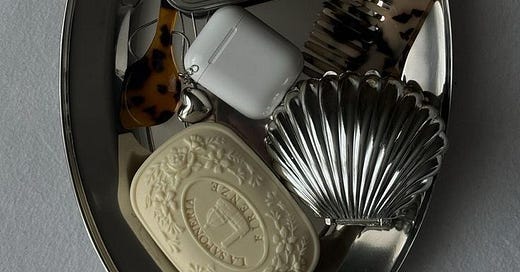What I own, What owns me
on the meaning of ownership, reinventing your life, letting go, possessions and powers
What does it really mean to own something?
This question popped into my head as I was reorganizing my closet, pulling out a trash bag to toss in anything I wouldn’t wear more than once a year. The hope, of course, is that the bag will eventually find its way to a donation center—or that I’ll finally have the urge to sell everything (though let’s be real, that might take forever).
Take my vintage Gucci bag, for example. If I sell it, am I the previous owner? Because "vintage" implies age, history, someone else’s belongings—maybe even their scent, their memory. Did I ever truly own it? Or was I just borrowing it for a moment in time? Just because I bought it with my hard-earned money, does that make it mine?
Possessions are a two-way street
Maybe that bag was never mine—just passing through, like seasons or names we’ve outgrown. Take, for example, that hollow laundry basket sitting in the corner. Yeah, I’m talking to you—the one you scrambled to order last minute on Amazon when you moved into your dorm or new apartment because the old one vanished in the chaos. That basket? It’ll probably outlive you.
People change. Our identities evolve. So why would our possessions be exempt from transformation?
Ownership, at its core, is an emotional placeholder for control, for stability, for identity. It’s utterly human to crave control over things: relationships, careers, family, destiny—even the unpredictable future.
Growing up in an Asian household, I was surrounded by a kind of organized maximalism (though trust me, I’ve seen worse). My mum has this saying: “If it’s not broken, it’s worth keeping.” That mindset lingered in our home, where holding onto things felt practical, even virtuous. Somewhere along the way, I twisted that logic into buying things I didn’t need, convincing myself they held value, comfort, or purpose. Over time, the line between want and need blurred, and I started to wonder who had a grip on whom.
My family is a lot of things — Buddhism is one of them. (although you’d see how they were going against this concept) Here’s their take: Anicca — Impermanence. It is saying our bodies and thoughts are subject to change, decay, and death. Nothing lasts — therefore, when we cling to objects, people, and concepts, we have created expectations that are going to result in disappointment, which leads to suffering, of course. That vintage bag? Temporary. The apartment you’re building your life inside? Temporary. The version of you who needed to buy that bag in the first place? Also temporary.
What the fu*k am I trying to say?
I guess I’m trying to admit it’s not that easy. Especially when you’re emotionally attached to something. I adore fashion—I always have. But it gets messy. I’ve had moments, honestly, of rage shopping. Like buying an entirely new wardrobe just to replace the one I already have. Even though I don’t go out every weekend. Even though I don’t need a fresh rotation every Monday for work. I knew that. And I still did it.
Sometimes it’s not just about the clothes—it’s about what I want them to do for me. Who I hope they’ll turn me into. And sometimes, it’s simply about the illusion of starting over, even if it’s only presented in fabric. Beneath the deep currents, I’m trying to explore who I am through what I own.
According to Buddhism, the goal isn’t to detach in apathy—it’s to live with awareness. To hold things lightly, not tightly. To recognize that everything we think we own is just visiting, and that our peace comes not from having, but from knowing when to let go.




